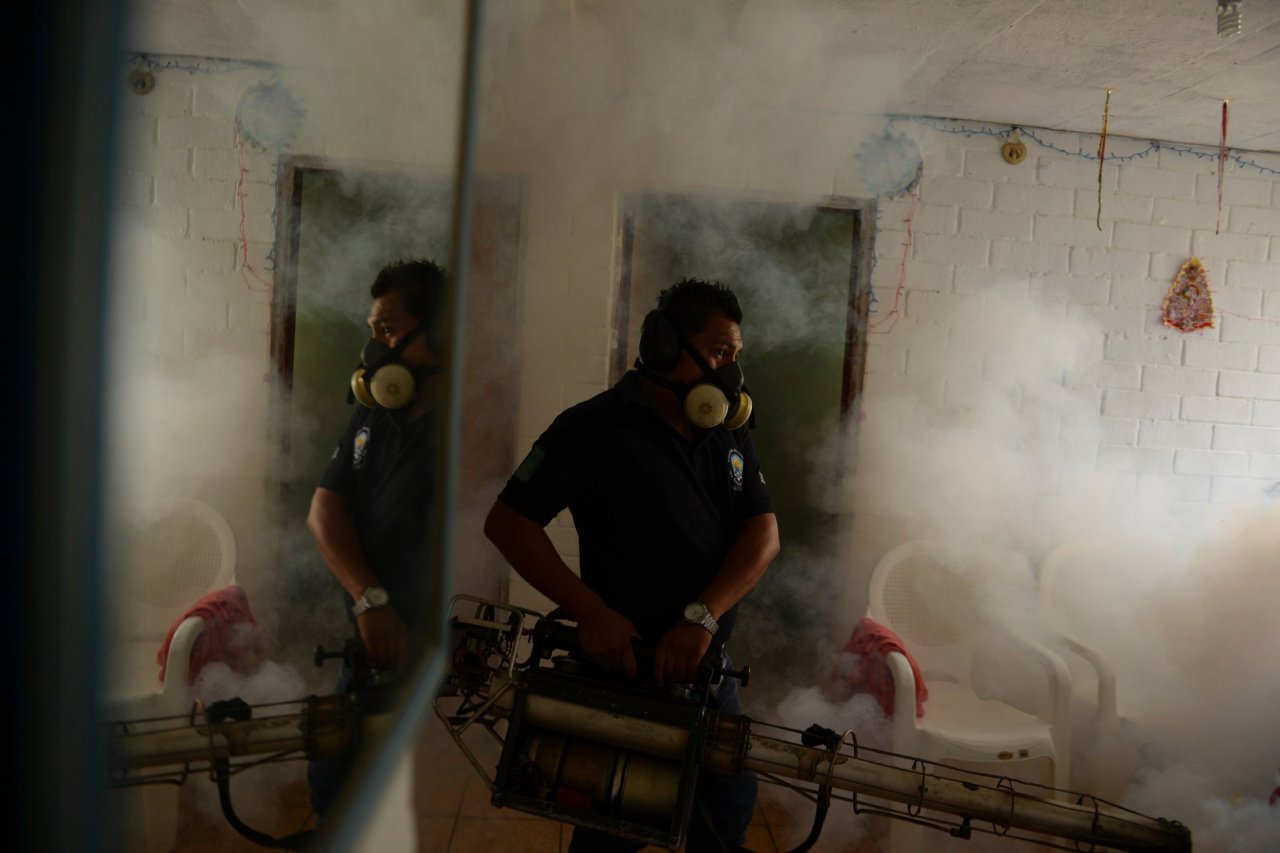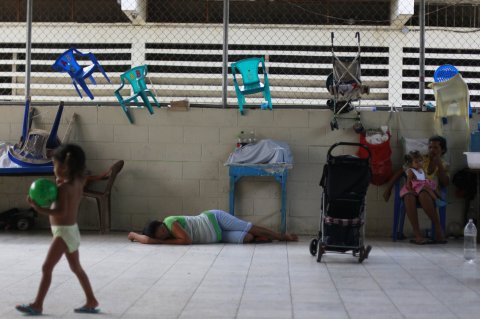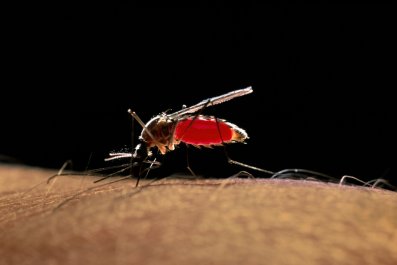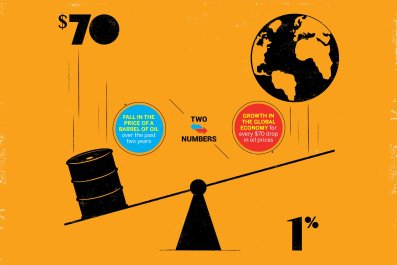
It could start with a fever, a rash, a headache or all three. More often than not, it spreads through the bloodstream with no symptoms. For most victims with symptoms, it means a week in bed with aching muscles and a high temperature, and then life returns to normal. But when you're pregnant, Zika is something much worse: It's the specter of having a baby with a skull like a curled fist, the virus having arrested brain growth sometime between when the mosquito bite infected the mother and the birth.
Microcephaly comes in a range—in the mildest cases, children can achieve normal intelligence. But many of the Zika cases emerging in Latin America are truly severe. Where a normal brain has ridges, doctors are seeing scans that show brains as smooth as a tumbled stone. In cases like these, the microcephaly might mean the baby will have seizures throughout his or her life, will never learn to speak or face a range of other developmental challenges.
With no vaccine or cure for Zika, nor much clinical knowledge as to how and why it and birth defects keep showing up together, world health officials are nervous. "We don't have an answer as to what is actually going on," Bruce Aylward, assistant director-general of the World Health Organization said plaintively last month. Scientists haven't even confirmed that Zika causes microcephaly, but they have determined that it can cross through the placenta from mother to fetus. They also know microcephaly cases are spiking wherever Zika has spread.
In El Salvador, the government last month urged women not to get pregnant until 2018, and the Ministry of Health said 96 pregnant women have recently been diagnosed with Zika. The governments of Colombia, Ecuador and Jamaica have issued similar advisories against getting pregnant. And with Zika expected to continue "spreading explosively" across nearly every country in the Americas, according to world health authorities, there may be more pregnancy advisories.
But in this part of the world, more than half of all pregnancies are unplanned, so the only practical effect of a no-pregnancy advisory is to create a huge amount of anxiety. After all, once pregnant, accidentally or otherwise, a woman's options in South America have mostly run out: Abortion is either severely restricted or completely off the table. Only seven countries in the world still ban abortion outright (even in cases of rape, incest and danger to the mother's life), and six of them are in Latin America. Zika is also spreading fast in the Caribbean; 97 percent of all the women of childbearing age in Latin America and the Caribbean live in countries where abortion is either highly restricted or completely banned.
Even contraception is hard to get in many of these countries. Honduras criminalizes abortion without exception and bars any emergency contraception. In El Salvador, contraception is scarce, rape is rampant, and abortion under any circumstance is punishable by up to 50 years in prison. The teenage pregnancy rate there is extremely high, with a third of all babies born in the country to mothers who are between 10 and 19. A sizable but hard to quantify portion of those pregnancies result from rape, according to El Salvador's health ministry, and 3 out of 8 maternal deaths there are suicides by pregnant girls under 19, according to government figures reported by Reuters in 2014.
Even though emergency contraception is technically legal in El Salvador, getting the Plan B pill—along with most other forms of regular contraception—requires a prescription. There's a clear socioeconomic divide: Wealthy city dwellers can buy birth control, but the poor can't afford either the doctor's appointment or the drugs. Outside the cities, it's even more difficult because "some women in rural areas don't have access to a doctor," says Paula Avila-Guillen, an advocate with the Center for Reproductive Rights.
Meanwhile, abortion laws in the heavily Catholic country are applied with unique zeal; women can be imprisoned for up to 50 years for "aggravated murder" of their fetuses. Activist groups like the Center for Reproductive Rights and the El Salvador-based Agrupación Ciudadana por la Despenalización del Aborto (Citizens' Group for the Decriminalization of Abortion) say that many of the women jailed for abortion were not trying to terminate their pregnancies. Instead, they suffered miscarriages or other pregnancy complications, and when they sought medical help or were found passed out or bleeding, their physicians called the cops.
In the earliest hours of the morning on November 24, 2011, María Teresa Rivera was overcome with an intense pain. Rivera, then 28 and the mother of a 10-year-old son, went into early labor in her bathroom. Her mother heard her screaming and called an ambulance. Rivera hadn't known she was pregnant, according to Jorge Menjívar, an activist with Agrupación Ciudadana who is working on her case. "She'd continued to bleed every month, to menstruate," so it hadn't crossed her mind. "But if a pregnant woman is bleeding, it's a sign of a high-risk pregnancy."
Rivera gave birth into the toilet, bleeding heavily. When she arrived at a nearby hospital, medical staff called the police to report her on suspicion that she'd attempted to give herself an abortion, and she was sent to prison. Despite a federal attorney determining that Rivera's rights were violated , she is now four years into a 40-year sentence, serving time in an overcrowded prison described by the U.N. Working Group on Arbitrary Detention as having "inhumane" conditions, while her 15-year-old son is being raised by her grandmother.

Meanwhile, despite the pervasive fear of the Zika virus, many in El Salvador are skeptical of the government's anti-pregnancy advisory. "It's scary in general to be a woman of reproductive age" in El Salvador, Avila-Guillen says. "You add the virus, it becomes very confusing." No one, she says, knows what the warning actually means, so telling women not to get pregnant without a nationwide campaign to give out free contraception—and a way to help women out of unwanted pregnancies—leaves implementation entirely to the imagination. The warning is "very naïve and irresponsible," Avila-Guillen says.
While contraception use is on the rise in El Salvador and the birth rate is declining, much of this trend is driven by soaring rates of women undergoing sterilization, according to the Population Reference Bureau. In 2004 (the last year for which there is good data), one-quarter of women under 30 chose to sterilize. Those decisions are often driven by the fear that other, less permanent methods of contraception will fail, leaving women stuck with unwanted pregnancies, according to a 2008 paper in The Medscape Journal of Medicine.
Many El Salvadorian women appeared to have poor knowledge about alternate methods—the researchers wrote that "several women expressed fear that failure of an IUD would result in the fetus being born with the IUD lodged in its head." In other cases, they thought they had no choice: "Many women said that they were sterilized because the doctor presented the procedure as the only method of pregnancy prevention." Sex education is limited; the main focus is abstinence.
Agrupación Ciudadana's Menjívar hopes the Zika panic—and the resultant focus on pregnancy—will force a "serious, scientific debate" about abortion laws in his country. Others have wondered whether Zika could become for Latin America what a rubella scare was for the United States in the 1960s. Before then, abortion was characterized in the U.S. as a procedure relied on only by sexually promiscuous women of low socioeconomic status. But then a rubella epidemic exploded—and women who contracted the disease began giving birth to permanently disabled babies. That began to change the conversation about abortion. Life magazine ran a cover story in 1965 focusing on white, middle-class women who were choosing to terminate pregnancies after contracting rubella and on their doctors who agreed to perform the procedures, noting the severe and lifelong health complications a baby born in that condition would face. It was presented as a sober decision and an obvious choice, backed by "reputable" and "brave" doctors.
That rubella cover story, published eight years before Roe v. Wade, stoked public sympathy for the procedure, which translated into legal changes; By 1968, four states had passed laws that permitted abortion if fetal deformities were detected, citing rubella as a primary example.
Zika might spark a similar conversation in Latin America, but for now, countries are simply scrambling to set up decent diagnostics for the disease, says Suzanne Serruya, director of the women's and reproductive health arm of the Pan American Health Organization. The actual diagnostic test for Zika is relatively new, and cumbersome: It takes as long as one week to determine via a blood test if someone has contracted Zika. Not all clinics are equipped to do it, and as many as a third of all Salvadorans may not have access to a clinic. And for pregnant women diagnosed with Zika, the anxious waiting period is much longer. They have to wait until the 24th week of pregnancy , when it is finally safe to draw the amniotic fluid required to find out whether the growing fetus is also infected.
For Serruya, that all adds up to one clear message: Preventing unwanted pregnancy—and mosquito bites—should be the focus. Her organization would never tell a woman not to get pregnant—"It's a woman's right" to choose when to have a baby, she says. Telling women in El Salvador not to become pregnant is a form of socioeconomic discrimination, she says, since impoverished women are least able to buy necessary supplies like nets and spray to protect themselves from mosquitoes. Rich women "would of course be able to get the type of protection they need" from both mosquitoes and pregnancy. Instead of issuing essentially useless no-pregnancy directives, countries should beef up their family planning resources, Serruya says, so women can take control over when to have a child.
In the meantime, the U.S. has launched a strong push to develop a Zika vaccine, with human trials beginning as soon as the end of this year. Brazil is unleashing genetically engineered mosquitoes to try to halt the spread of the infected ones. As the science about the virus gets better, women in infected countries must wait for reproduction advisories to catch up.



















